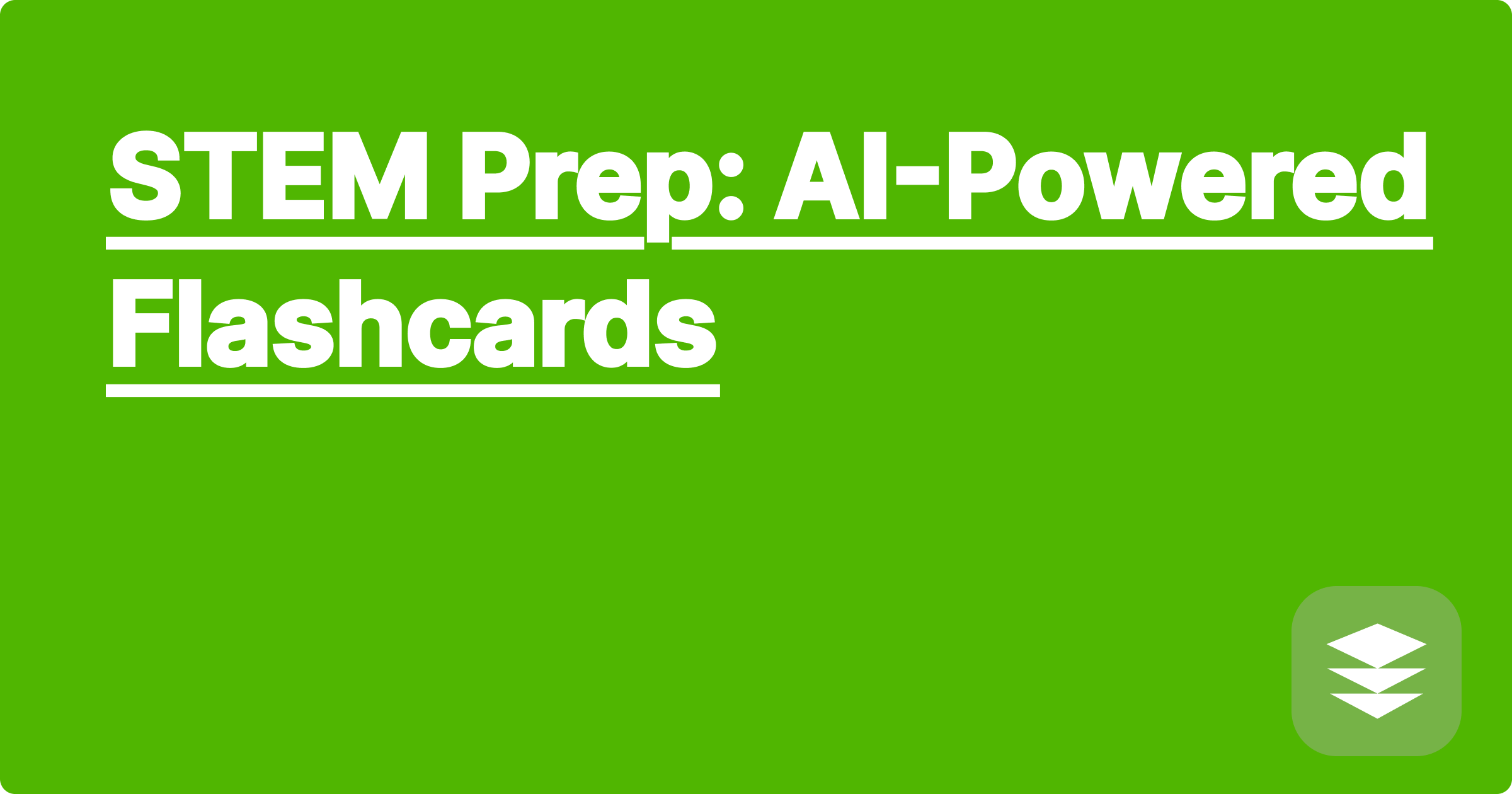
The demanding landscape of STEM education and research presents a significant challenge: mastering vast amounts of complex information. From intricate mathematical formulas to intricate biological processes and nuanced chemical reactions, STEM fields require a deep understanding of interconnected concepts. This often translates into countless hours spent memorizing facts, theories, and procedures. Fortunately, the rise of artificial intelligence offers a powerful new toolkit for tackling this challenge, providing innovative solutions to enhance learning and retention. AI-powered flashcards represent one such solution, offering a dynamic and personalized approach to studying that can significantly improve the efficiency and effectiveness of STEM learning.
For STEM students and researchers, efficient learning is not just a desirable skill; it's a necessity. The sheer volume of information encountered in these fields demands effective study strategies. Traditional methods, like rote memorization and static flashcards, can be time-consuming and often fail to foster deep understanding. AI-powered flashcards, on the other hand, leverage the power of algorithms to personalize the learning experience, adapt to individual strengths and weaknesses, and optimize retention. This ultimately empowers STEM students and researchers to learn more effectively, freeing up valuable time for deeper exploration and critical thinking. Embracing these tools represents a crucial step towards achieving academic and professional success in the demanding world of STEM.
Traditional learning methods often fall short in STEM fields due to several key factors. The interconnected nature of STEM concepts requires more than just memorizing isolated facts. Students need to understand the relationships between different concepts and apply them in various contexts. Simple flashcards often lack the context and depth needed to build this understanding. Furthermore, traditional study methods can be monotonous and demotivating, leading to procrastination and inefficient use of study time. The passive nature of reviewing static flashcards doesn't actively engage the learner, making it difficult to retain information long-term. Finally, the sheer volume of material covered in STEM courses can be overwhelming. Managing and reviewing hundreds or even thousands of flashcards can be a logistical nightmare, making it difficult to prioritize the most important information.
AI tools like ChatGPT, Claude, and Wolfram Alpha offer a dynamic solution to these challenges. They can be used to create intelligent flashcards that adapt to individual learning needs. Instead of static question-and-answer pairs, these AI-powered flashcards can provide context-rich information, generate practice questions, and even offer personalized feedback. ChatGPT and Claude can be used to create flashcards that explain complex concepts in clear, concise language, while Wolfram Alpha can be leveraged to generate flashcards related to specific formulas, equations, and scientific data. These tools can also be used to create spaced repetition systems, which optimize learning by presenting information at increasing intervals based on individual performance.
Using ChatGPT to generate AI-powered flashcards involves a conversational approach. Begin by providing ChatGPT with the core concept you want to learn. For example, you might ask it to create flashcards about "the Krebs cycle" or "Newton's laws of motion." Then, refine your request by specifying the type of information you want included on each flashcard. You might ask for definitions, examples, applications, or even related concepts. ChatGPT will then generate a series of flashcards based on your input. You can further refine these flashcards by asking ChatGPT to rephrase information, provide more detail, or add visual aids.
With Wolfram Alpha, the process is more focused on specific computations and data retrieval. You can input a formula or equation, and Wolfram Alpha will generate related flashcards. For example, you could input the quadratic formula, and Wolfram Alpha will generate flashcards that include the formula itself, example problems, and explanations of its different components. You can also use Wolfram Alpha to generate flashcards related to specific scientific constants, physical properties, or mathematical theorems.
Consider a student learning about organic chemistry. They could ask ChatGPT to create flashcards about "functional groups." ChatGPT might then generate a flashcard with the question "What is a carboxyl group?" and the answer "A carboxyl group is a functional group consisting of a carbonyl group (C=O) and a hydroxyl group (-OH) attached to the same carbon atom. It is often written as -COOH or -CO2H." Another example could involve using Wolfram Alpha to learn about the ideal gas law. A student could input the equation PV=nRT, and Wolfram Alpha would generate flashcards defining each variable (P=pressure, V=volume, n=number of moles, R=ideal gas constant, and T=temperature), providing example calculations, and explaining the relationship between these variables.
To effectively use AI-powered flashcards, prioritize active recall. Instead of passively reading the information, try to answer the question before flipping the card. This forces your brain to actively retrieve the information, strengthening memory and comprehension. Regularly review and update your flashcards. As you learn more, refine your flashcards to reflect your evolving understanding. Don't be afraid to experiment with different AI tools and techniques. Each tool offers unique capabilities, so find what works best for your learning style. Finally, integrate AI-powered flashcards into a broader study strategy. Use them in conjunction with other learning methods, such as active reading, problem-solving, and group discussions.
To maximize your STEM learning journey with AI, explore the different features offered by each tool. Experiment with different prompting techniques to refine the generated flashcards. Consider incorporating multimedia elements like images and diagrams to enhance understanding. Regularly assess your progress and adjust your learning strategies accordingly. By embracing these tools and strategies, you can transform your study habits and unlock your full potential in the exciting world of STEM.
Ace STEM Exams: AI Study Planner
AI for Lab Data: Analyze Faster
STEM Prep: AI-Powered Flashcards
AI Coding Assistant: Debug Code
Engineering AI: Design & Simulate